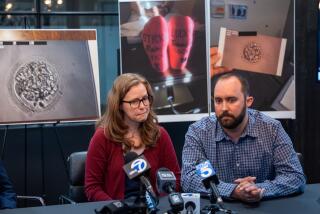Lawsuit Over Infection Settled by Sperm Bank : Health: A woman who claimed she got a herpes-like virus from insemination receives $450,000. The clinic disputes the contention.
- Share via
SANTA ANA — A woman who said she was infected with a disease after being inseminated at a sperm bank here was awarded $450,000 by the clinic in an out-of-court settlement.
The clinic’s director Thursday questioned the claim, saying it was never clear that the patient had the virus or when she contracted it. The settlement was reached with the clinic’s insurer.
Betty Lou Brau, of the Los Angeles suburb of Arcadia, said in a lawsuit that she became ill with herpes-like cytomegalovirus after being inseminated with a donor’s sperm at the Fertility Center of California in 1986. The suit claimed that the sperm was tainted with the virus.
Cytomegalovirus commonly causes flu-like symptoms in adults and is the leading infectious cause of birth defects in the United States.
Dr. Thomas Cesario, an infectious-disease specialist at the UCI Medical Center in Orange, said 80% of the population could be carrying cytomegalovirus, but it usually does not cause serious problems.
“It is very hard to know definitively how one gets it,” Cesario said. “It’s a very common virus.”
The clinic’s lawyer, Donald R. Davidson III of Tustin, said there was no proof that Brau contracted the virus as a result of the insemination.
In a sworn statement, Brau said that when she became sick with the virus, clinic director Herlinda Sullivan told her that the sperm donor was also infected with the virus.
Sullivan, who was unable to identify the symptoms Brau suffered, denied the statement.
“We didn’t know that. How could I tell her that?” Sullivan said. “When she was in the hospital, they didn’t have a diagnosis yet.
“The last thing I heard from Dr. Cesario, they weren’t absolutely sure that it was CMV,” she said, adding that the conversation was in 1987.
The donor’s identity was unknown to Brau, following a judge’s ruling that he could remain anonymous.
Sullivan said Brau did not become pregnant as a result of the insemination and did not know whether Brau had tried to become pregnant since then.
Asked if Brau could have had the virus before being inseminated, Sullivan answered, “It was never proven that she didn’t.”
Brau’s attorney, Martin R. Berman of Norwalk, said it is the first case of its kind. “I don’t think there is any other case in the country like this one,” Berman said.
Brau and her husband have one child from a successful insemination in 1979.
More to Read
Sign up for Essential California
The most important California stories and recommendations in your inbox every morning.
You may occasionally receive promotional content from the Los Angeles Times.













